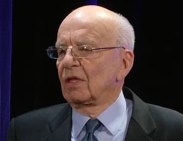Old media, some think, is headed for the graveyard, and they’ll be damned if it takes young and cool new media with it. But it ain’t dead yet, and some growling comments made today by Rupert Murdoch, the CEO and chairman of News Corp., underscored how it will continue to keep on ticking for some time still.
In a conference call today to discuss the confirmation that News Corp. will, in fact, split its empire into two businesses — entertainment/media and print/publishing — Murdoch sounded out to quiet the “naysayers” that think the board is concerned about the long-term fortunes of publishing, and therefore is cutting the business off. “This could not be further from the truth,” he said. “People will pay for news. It is the most valuable commodity in the world.” He pointed out that the charging models for newspapers and apps are working, “And we are going to push them even harder.”
There was a sign earlier this week of what he means by that. The Wall Street Journal, part of News Corp., announced a deal with in reading app Pulse in which Pulse will sell in-app subscriptions for selected channels of Wall Street Journal content. These will be priced as less expensive than the WSJ’s $4.99/ month cost for access to the whole site, and are therefore aimed at targeting new readers for the newspaper. It’s in contrast to Flipboard’s deal with the New York Times, which is using its Flipboard relationship to sweeten the deal for its basic subscribers, by giving them another place to consume the content for which they pay already.
Over in the UK, however, there are signs that the company is also looking at ways of being a bit more flexible about its paywall stance, rather than becoming even more hardline about it. Earlier this month, The Times dropped its online paywall for the Queen’s Jubilee anniversary, the first time it’s done this since charges came into effect in 2010.
Those charges initially caused a 90 percent decline, a drop of 4 million users, but numbers have been steadily increasing since March 2011 and are now at 265,740 subscribers. “We’re really pleased with the results so far,” Nick Bell, director of digital products for News Corp division News International, told me today, but wouldn’t say whether those subs revenues had reached parity with what it used to make from online ads.
Murdoch didn’t get into too many details about how the split would work — for example no news on whether this will mean a renewed focus to get full control of BSkyB in the UK — but he did note that he will be chairman of both companies, but CEO only of the media and entertainment entity. It will take 12 months to untangle the companies, he said, and the publishing company will also contain a new digital education group to bolster its business — and probably to better compete against Pearson. Digital will go in both parts — for example the media division will contain its stake in Hulu.
He said that the move to separate the companies was three years in the planning and flatly denied that it was made in response to the huge phone hacking scandal that hit the company last year and is still being played out in a parliamentary investigation in the UK. “Right now is the time to proceed with this,” he said, to help achieve “fair value” for News Corp’s assets.
